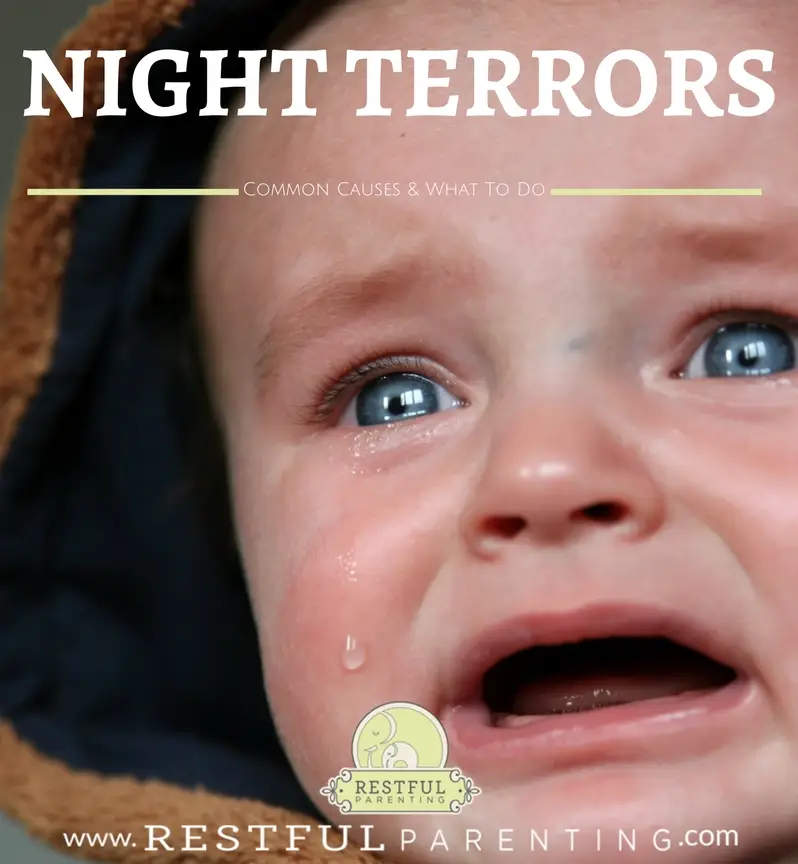Night Terrors: Common Causes & What You Can Do
Share this:

Is your child waking with night terrors?
You know you are dealing with night terrors when it’s late at night and everyone is sleeping soundly until you are startled awake by your child’s scream! Your heart is in your throat as your mind quickly runs through all the scenarios that would cause your child to scream like that. You jump out of bed and run down the hall to their bedroom, open their door to find they are sitting in bed still screaming that blood curdling scream! You rush to their bedside and immediately try comforting them and start doing everything and anything you can possibly think of to help but they are not calming down at all. In fact, they don’t even seem to notice you are there. They are staring right through you like you aren’t even there, still calling your name. A little scary for any parent! Although it can be traumatic as a parent, your child will not remember the event!
Nightmare or night terror?
What is the difference? A nightmare is a bad dream. With a nightmare the child will most likely wake up, cry and once you enter the room, they will either climb into your lap, hug you, or start talking right away. They will see you, acknowledge you are there and calm with your presence.
A night terror on the other hand, is when your child wakes up from sleep screaming inconsolably and does not appear to even know that you are there. A night terror usually lasts 5-10 minutes but can last up to 30 minutes!
A child who is having a night terror might:
- Continue to scream for you when you are sitting in front of them
- Appear like they are looking right through you
- Breathe heavily, their heart may be racing or they may be sweating
- Try to get out of bed and walk around
- Fall asleep almost instantly when the episode is over
- Not remember the event
Contributing factors for night terrors
There are some factors in your child’s everyday life that may contribute to night terrors. Some of the more common reasons are:
- A sudden change in schedule and routine
- Stress (emotional stress – doesn’t necessarily need to be something traumatic.) Perhaps something is bothering them from school or elsewhere.
- Food sensitivities or allergies
- Sleeping in unfamiliar surroundings
- An over-full bladder
- Certain medications (antibiotics, steroids, etc.) can contribute to night terrors or sleep disturbances
Note: Sleep terrors tend to run in families and may be paired with sleepwalking
What can you do for your child when they are having a night terror?
Sit beside them and comfort them with a soothing voice. Don’t attempt to pick them up, or wake them. Trying to end the night terror can actually make it last longer. It may seem counter-intuitive, but you need to allow the night terror to run it’s course.
In most cases, your child will have no idea that you are there but you want to remain present so that you can prevent them from thrashing and possibly harming themselves. You child may wake up at the end of the night terror episode and that is when your presence will really help to calm them if they are distraught. Most children experiencing a night terror will go right back to sleep as if nothing happened.
Making some adjustments to your child's day can help reduce or eliminate night terrors all together, here are some recommendations:
- Ensure that your child has a well established, relaxing bedtime routine.
- Encourage an early bedtime since going to bed overtired can lead to sleep disturbances and night terrors.
- Maintain a consistent schedule and routine throughout the week, as well as on weekends.
- Take a few minutes to ensure that you connect with your child before bed every night
Keep a log to track possible causes.
To really get a handle on night terrors it is important to start logging your child’s day and look for any patterns – how often, when and how long they last can be useful information to share with your doctor and help you in your search for answers. Log everything in your child’s day to see if there are any links from what they ate, played with, watched or did that day.
Keeping track of the day time happenings and night terrors will allow you to see a clear pattern, which you can give you inside to predict the night terrors. You can then begin to partially waking them before the night terror may happen to help them transition into another sleep cycle. This can eliminate the night terror all together.
Know you are not alone
Night terrors can be quite common in children and stressful on parents. It is beneficial to find a support person that you can talk to you and discuss your specific situation in hopes of finding a solution. We offer our All Things Sleep and Parenting Facebook Group where you will find other parents going through similar experiences, discussions and support to help you. We also offer our sleep consulting services should you wish to get advice specific to your child’s situation, find out more on our services page.


